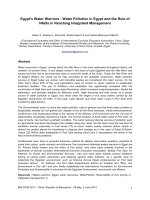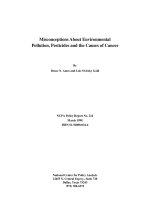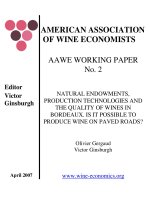- Trang chủ >>
- Khoa Học Tự Nhiên >>
- Vật lý
enlightenment contested philosophy modernity and the emancipation of man 1670-1752 nov 2006
Bạn đang xem bản rút gọn của tài liệu. Xem và tải ngay bản đầy đủ của tài liệu tại đây (8.02 MB, 1,009 trang )
ENLIGHTENMENT CONTESTED
This page intentionally left blank
Enlightenment
Contested
Philosophy, Modernity, and the Emancipation
of Man 1670–1752
JONATHAN I. ISRAEL
1
1
Great Clarendon Street,Oxford OX2 6DP
Oxford University Press is a department of the University of Oxford.
It furthers the University’s objective of excellence in research, scholarship,
and education by publishing worldwide in
Oxford New York
Auckland Cape Town Dar es Salaam Hong Kong Karachi
Kuala Lumpur Madrid Melbourne Mexico City Nairobi
New Delhi Shanghai Taipei Toronto
With offices in
Argentina Austria Brazil Chile Czech Republic France Greece
Guatemala Hungary Italy Japan Poland Portugal Singapore
South Korea Switzerland Thailand Turkey Ukraine Vietnam
Oxford is a registered trade mark of Oxford University Press
in the UK and in certain other countries
Published in the United States
by Oxford University Press Inc., New York
© Jonathan I. Israel 2006
The moral rights of the author have been asserted
Database right Oxford University Press (maker)
First published 2006
All rights reserved. No part of this publication may be reproduced,
stored in a retrieval system, or transmitted, in any form or by any means,
without the prior permission in writing of Oxford University Press,
or as expressly permitted by law, or under terms agreed with the appropriate
reprographics rights organization. Enquiries concerning reproduction
outside the scope of the above should be sent to the Rights Department,
Oxford University Press, at the address above
You must not circulate this book in any other binding or cover
and you must impose the same condition on any acquirer
British Library Cataloguing in Publication Data
Data available
Library of Congress Cataloging in Publication Data
Data available
Typeset by Newgen Imaging Systems (P) Ltd., Chennai, India
Printed in Great Britain
on acid-free paper by
Clays Ltd.,St Ives plc
ISBN 0–19–927922–5 978–0–19–927922–7
13579108642
Preface
Was the Enlightenment in essence a social or an intellectual phenomenon? The
answer, arguably, is that it was both and that physical reality and the life of the mind
must be seen to be genuinely interacting in a kind of dialectic, a two-way street, if
we are to achieve a proper and balanced approach to this fundamental topic.Does it
really matter how we interpret the Enlightenment? Surely, it does. For while it has
been fashionable in recent years, above all (but not only) in the Postmodernist camp,
to disdain the Enlightenment as biased, facile, self-deluded, over-optimistic,
Eurocentric, imperialistic, and ultimately destructive, there are sound, even rather
urgent, reasons for rejecting such notions as profoundly misconceived and insist-
ing, on the contrary, that the Enlightenment has been and remains by far the most
positive factor shaping contemporary reality and those strands of ‘modernity’ any-
one wishing to live in accord with reason would want to support and contribute to.
It is consequently of some concern that we almost entirely lack comprehensive,
general accounts of the Enlightenment which try to present the overall picture on a
European and transatlantic scale; and also that there still remains great uncertainty,
doubt, and lack of clarity about what exactly the Enlightenment was and what intel-
lectually and socially it actually involved. For much of the time, in the current
debate, both the friends and foes of the Enlightenment are arguing about a histor-
ical phenomenon which in recent decades continues to be very inadequately under-
stood and described. In fact, since Peter Gay’s ambitious two-part general survey
The Enlightenment: An Interpretation, published in 1966, there have been hardly any
serious attempts, as Gay puts it, to ‘offer a comprehensive interpretation of the
Enlightenment’. Especially disturbing is that it remains almost impossible to find a
reasonably detailed general account of the crucially formative pre-1750 period and
that there is nowadays among general historians of the eighteenth century, as
distinct from philosophers and specialists in political thought, rarely much
discussion of the Enlightenment’s intellectual content as opposed to the—accord-
ing to most current historiography—supposedly more important social and mate-
rial factors.
The purpose of this present account is to attempt to provide a usable outline sur-
vey and work of reference, enabling the general reader, as well as the student and
professional scholar, to get more of a grip on what the ideas of the Enlightenment
actually were, and one which at the same time denies that the social, cultural, and
material factors are of greater concern to historians than the intellectual impulses
but does so without simply reversing this and claiming ideas were, therefore, more
crucial than the social process. Rather, my aim is to strive for a genuine balance,
showing how ideas and socio-political context interact while yet approaching this
interplay of the physical and intellectual from the intellectual side, that is running
against the nowadays usual and generally received preference. The reason for this
contrary emphasis is that the intellectual dimension, it seems to me, is by far the less
well-understood side of the equation and hence at present much more in need of
reassessment than the social and cultural aspects.
One of the most controversial questions about the Enlightenment in recent years
has been that concerning its precise relationship to the making of revolutions, a
question closely tied, in turn, to that concerning its relationship to ‘modernity’
more generally. Odd though this may appear today, it was often claimed, from the
late seventeenth to the mid nineteenth century, in books, pamphlets, sermons, and
newspapers, that ‘philosophy’ had caused, and was still causing, a ‘universal revolu-
tion’ in the affairs of men. After 1789, it was usual to link this notion to the French
Revolution in particular and view that vast upheaval as the ‘realization of philo-
sophy’.¹ But there was nothing new about bracketing ‘philosophy’ with modern
‘revolution’ in the early nineteenth century,or indeed earlier,and it is vital to bear in
mind that in the decades before and after 1789 there were all kinds of other ‘revolu-
tions’ beside that in France—not all violent and not all political, but all very closely
associated with the unprecedented, and to many deeply perplexing, impact of
philosophers and philosophy.
For some time after 1789, the French Revolution and its offshoot upheavals
across the European continent and in the Americas, including by the 1820s the
major revolutions in Greece and Spanish America,were usually thought of as essen-
tially parts of a much larger and more ‘universal’ revolution generated by ‘philo-
sophy’ or, to be more exact, what in the previous century had come to be known as
l’esprit philosophique or sometimes philosophisme.For l’esprit philosophique, as a
French revolutionary statesman interested in this question, Jean-Étienne-Marie
Portalis, pointed out in 1798,was actually something very different from philosophy
in general. For most philosophers, including those embracing a strict empiricism
and confining themselves to what could be deduced from ‘l’observation et l’expéri-
ence’, as well as those adhering to the German idealist systems, had long sought to
curtail philosophy’s scope and reconcile reason with religious belief. L’esprit
philosophique, by contrast, while also a ‘résultat des sciences comparées’, was defined
precisely by its refusal to limit philosophy’s scope to specified parts of reality, its
sweeping aspiration to embrace and redefine the whole of our reality: revolutionary
‘esprit philosophique’, in other words, claimed, as Portalis puts it, to be ‘applicable à
tout’.² Above all, as against other sorts of philosophy, philosophisme was ‘une sorte
d’esprit universel’.
Post-1789 attribution of the ‘revolution’ to l’esprit philosophique was frequent but
in essence no different from the many examples of pre-1789 complaints about dan-
gerous new forms of thought infiltrating religion, social theory, and politics in such
a way as to threaten the basic structures of authority, tradition, faith, and privilege
Preface
vi
¹ McMahon,Enemies of the Enlightenment,56.
² Portalis, De l’usage et de l’abus, i. 114–15.
on which ancien régime society rested. Modern historians and students, of course,
are apt to dismiss this sort of thing as a figment of the collective imagination of the
time, an illusion powerfully fed by ideological obsessions and bias which only very
vaguely corresponds to the historical reality. In recent decades, it has been deeply
and more and more unfashionable among historians, in both Europe and America,
to explain the French Revolution,the greatest event on the threshold of‘modernity’,
as a consequence of ideas. Marxist dogma with its stress on economic reality and
cultural superstructure helped generate this near universal conviction. But another
major justification for this in some ways distinctly peculiar article of the modern
historian’s creed is the growing democratization of history itself: students especially,
but professors too, readily take to the argument that most people, then as now, do
things for exclusively ‘practical’ reasons and have no interest in matters intellectual.
Any attempt to stress the impact of the philosophes is nowadays routinely objected
to on the ground that the vast majority knew next to nothing about them or their
books and cared even less.
This, of course, is perfectly true. But there is an important sense in which this
fashionable objection misses the point. For those who inveighed most obsessively
against new ideas before and after 1789 also insisted that most people then, as now,
neither knew nor cared anything about ‘philosophy’. Yet practically all late eigh-
teenth- and early nineteenth-century commentators were convinced, and with
some reason, that while most failed to see how philosophy impinged on their lives,
and altered the circumstances of their time, they had all the same been ruinously led
astray by ‘philosophy’; it was philosophers who were chiefly responsible for pro-
pagating the concepts of toleration, equality, democracy, republicanism, individual
freedom, and liberty of expression and the press, the batch of ideas identified as the
principal cause of the near overthrow of authority, tradition, monarchy, faith, and
privilege. Hence, philosophers specifically had caused the revolution.
Throne, altar, aristocracy, and imperial sway, according to spokesmen of the
Counter-Enlightenment, had been brought to the verge of extinction by ideas
which most people know absolutely nothing about. Most of those who had sup-
ported what conservative and middle-of-the road observers considered corrosive
and pernicious democratic concepts had allegedly done so unwittingly, or without
fully grasping the real nature of the ideas on which the ringing slogans and political
rhetoric of the age rested. Yet if very few grasped or engaged intellectually with the
core ideas in question this did not alter the fact that fundamentally new ideas had
shaped, nurtured, and propagated the newly insurgent popular rhetoric used in
speeches and newspapers to arouse the people against tradition and authority.
Indeed, it seemed obvious that it was ‘philosophy’ which had generated the revolu-
tionary slogans, maxims, and ideologies of the pamphleteers, journalists, dema-
gogues, elected deputies, and malcontent army officers who, in the American,
French, Dutch, and Italian revolutions of the 1770s, 1780s, and 1790s, as well
as the other revolutions which followed proclaimed and justified a fundamental
break with the past.
Preface
vii
The kind of ‘philosophy’they had in mind, like its social and political impact, was
plainly something fundamentally new. What was not at all new was the turmoil,
violence, and fanaticism accompanying the revolutionary process. For if the com-
mon people were perfectly capable of causing all sorts of agitation, instability, and
disruption without any help from philosophers, the conceptual overthrow of altar,
throne, and nobility was considered, surely rightly, something previously wholly
unimagined and inconceivable which,consequently, had little inherently to do with
economic need, social pressures, or the allegedly innate unruliness of the plebs.
Rather, such upheaval could only stem from a revolutionary transformation in the
people’s way of thinking.
Not only was the foundational role of ‘philosophy’ heavily stressed by
contemporaries in the early nineteenth century, but there was also a clear grasp of
the later obscured, yet perhaps rather obvious, fact that it makes little sense to seek
the causes of the ‘revolution’in the decades immediately preceding 1789; for a great
revolution in thought and culture takes time. One must look back to the century
before 1750 to locate the intellectual origins and early development of what tran-
spired in the revolutionary era. It was not popular grievances, economic causes,
obsolete institutions, lack of liberty, or any material factor, according to Antonio
Valsecchi,in a book posthumously published in Venice in 1816,but specifically spir-
ito filosofico which in Italy, as in France and the rest of Europe, had virtually
destroyed ‘society,commerce, discipline,faith, and throne’, a revolution of the mind
culminating in Voltaire and Rousseau certainly but whose real origins lay further
back, in the seventeenth century. The true originators of the French Revolution, he
says, were not Rousseau or Voltaire but ‘Tommaso Hobbes d’Ingilterra, e Benedetto
Spinosa di Olanda’, truly world-shaking and subversive philosophers whose deadly
work of corrosion had been continued, again in Holland, by the no less subversive
‘Pietro Bayle’.³
Yet this interpretation of the revolutionary upheavals of the late eighteenth cen-
tury in essence scarcely differed from that of another Italian professor, Tommaso
Vincenzo Moniglia (1686–1787), at Pisa, who over seventy years earlier, in 1744,
warned the Italian reading public that recent intellectual trends in France, inspired
by the English ‘Deists’ Anthony Collins and John Toland, using ideas introduced by
Spinoza, were producing a new and dangerous kind of philosophy, one which over-
turns all existing principles, institutions, codes of custom, and royal decrees. Their
ideas, he argued, entail a ‘total revolution in ideas, language, and the affairs of the
world’, leading to a drastically changed society in which Spinosismo, or as another
Italian writer of the period, Daniele Concina, put it, ‘questa mostruosa divinita
Spinosiana’ [this monstrous Spinozist divinity], would reign supreme, meaning
that in place of faith, hierarchy, and kingship everything would henceforth be based
on physical reality alone and ‘on the interests and passions of individuals’.⁴
Preface
viii
³ Valsecchi, Ritratti o vite, 101–2.
⁴ Moniglia, Dissertazione contro i fatalisti, ii. 21–2; Israel, Radical Enlightenment,523–4.
Moniglia’s and Concina’s admonitions about Spinosismo and ‘universal revolution’
in the mid eighteenth century,in turn,differed little in substance from other warnings
issued still earlier. At the beginning of the century, the Anglo-Irish High Church
divine William Carroll, in the second part of his pamphlet Spinoza Reviv’d (London,
1711), maintained that philosophy based on what he calls ‘Spinoza-principles’,
meaning militant Deism based on one-substance philosophy, ‘fundamentally sub-
verts all natural and reveal’d religion, [and] overthrows our constitution both in
church and state’.⁵ The earliest avowals along these lines indeed reach back to the
late seventeenth century. In 1693, for example, a prominent German court official
of wide experience, the Freiherr Veit Ludwig von Seckendorff (1626–92), thought it
quite wrong to suppose, as many theologians did, that ‘atheistic’ philosophy of the
kind propagated by Spinoza undermines only religion and theology; for by making
life in this world, and individual expectations, the basis of politics Spinozism
equally threatened to liquidate all royalty, and their courts and courtiers,as well.⁶ In
1681, similarly, the French Calvinist Pierre Yvon (1646–1707) avowed that Spinoza
not only destroys theology philosophically, reducing morality to a mere calculus of
individual advantage, but that his political theory authorizes everyone to instigate
political rebellion.⁷
Across Europe,the radical-minded, as well as many religious thinkers,were quick
to grasp that a fundamental revolution of the mind must eventually translate also
into political revolution. The threat to the political, religious, and social status quo
posed by ‘Spinoza-principles’ was colourfully alluded to by the anonymous author
of the tract Rencontre de Bayle et de Spinosa dans l’autre monde, published in 1711 in
Holland—though with ‘Cologne’ declared on the title page—a work designed to
tighten the reading public’s association of Bayle with Spinoza by implying these two
great thinkers shared not just parallels in their lives, both being refugees from
Catholic, monarchical intolerance in quest of individual freedom of thought, but
also common philosophical aims.⁸ In the imaginary dialogue between the two, set
in the next world,‘Bayle’assures ‘Spinosa’that while some approved the latter’s self-
portrayal (in his sketch-book, found after his death) in the fisherman’s garb of the
notorious seventeenth-century insurgent Masaniello—a symbol in Spinoza’s day of
popular revolt against monarchical oppression⁹—his enemies feared this might
imply that ‘what Masaniello had brought about in fifteen days [i.e. a democratic
revolution], in Naples, you would likewise accomplish in a short time, in the whole
of Christendom’.¹⁰
Later Counter-Enlightenment accusations associating philosophy and the
philosophes with revolution, then, once stripped of ideological bias, possess
Preface
ix
⁵ Carroll, Spinoza Reviv’d Part the Second,7.
⁶ Seckendorff, Christen-Staat, i.12, ii. 139–41.
⁷ Yvon, L’Impiété convaincue, 212, 362, 400, 411–12.
⁸ Rencontre de Bayle et de Spinosa, 21–2, 31.
⁹ Meinsma, Spinoza et son cercle, 473; Stone, Vico’s Cultural History, 3, 31,115.
¹⁰ Rencontre de Bayle et de Spinosa, 12; See also Stewart, Courtier, 95–7.
a considerable degree of cogency and deserve more attention from scholars than
they have hitherto received. For the trends towards secularization, toleration, equality,
democracy, individual freedom, and liberty of expression in western Europe and
America between 1650 and 1750 were arguably powerfully impelled by ‘philosophy’
and its successful propagation in the political and social sphere; and just as the
Counter-Enlightenment affirmed, in the end such ideas were bound to precipitate a
European and American revolutionary process, of a type never before witnessed. If,
moreover, in recent decades most historians of both Enlightenment and the French
Revolution have repudiated interpretations emphasizing the role of ideas, claiming
the revolutionary movements were primarily social and cultural phenomena best
understood by focusing on social relations and material factors, there remain formi-
dable unresolved difficulties with this conception.For the results produced by recent
social historical research hardly seem to justify the continuing emphasis on a pri-
marily ‘social’approach.No one has been able to specify what the allegedly profound
social changes which lay behind the Enlightenment and Revolution actually were
or even how shifts in social structure, given their reality, could broadly and sponta-
neously translate into a popularly driven ‘universal revolution’ designed to transform
the core principles upon which society and politics rest.
In any case, a reverse shift of emphasis back to the study of ideas in their
historical setting may produce useful results for the history of Enlightenment,
modern revolutions, and the history of western ‘modernity’ itself. Recent claims
about social structure, material factors, and the people’s unawareness of new ideas
notwithstanding,it remains fundamentally implausible that the ‘modern’core con-
cepts of equality, democracy, and individual freedom sprang directly out of a process
of social change or cultural adjustment, or became central to ‘modern’ society and
politics, or could enter the public sphere at all, without being forged, defined, and
revised through a process of intellectual debate. And even if some readers remain
convinced that socially and culturally driven changes, not ideas, must be the pri-
mary factors in the historical process, the intellectual side of the history of modern
revolution still remains one of immense drama, complexity, and interest which
needs to be surveyed in a more comprehensive fashion than it has been.
In my earlier book, Radical Enlightenment, a start was made to describing how
philosophical debates in the late seventeenth and early eighteenth centuries gener-
ated the radical edge of the western Enlightenment. Here, my aim is to offer a much
wider and more general reassessment of the Enlightenment as it developed down to
the early part of the battle over the Encyclopédie (1751–2),giving particular empha-
sis to the Enlightenment’s essential duality, that is the internal struggle between the
opposing tendencies which from beginning to end always fundamentally divided it
into irreconcilably opposed intellectual blocs. In doing so,I shall try to demonstrate
how, historically and philosophically, the main line in the development of modern
‘enlightened’ values transferred from the earlier centre in the Dutch Republic to
other parts of Europe by the mid eighteenth century and especially France, which,
from the 1720s onwards, increasingly presided intellectually and culturally over the
emergence and development of radical,democratic, and egalitarian ideas.
Preface
x
Besides seeking to show how ideas of equality,toleration,democracy,and individual
freedom came to challenge monarchy, aristocracy, authority, and tradition, this study
also deals with the intellectual beginnings of anti-colonialism and the radical
critique of European imperial sway over non-European peoples.Additional themes
are the Enlightenment’s always dual and divided quest to engage with the non-
European ‘other’, and specifically classical Chinese culture and the world of Islam,
together with other ramifications of the late seventeenth- and early eighteenth-
century revolution in scholarship and ideals of learning.
In the research for, and writing of, this book I have been greatly assisted by the
Institute for Advanced Study at Princeton to which I owe an immense debt of gra-
titude. I would like, in the first place, to thank Susan Schneller, Marian Zelazny, Julia
Bernheim Kirstie Venanzi, and Marcia Tucker, all of whom have been wonderfully
supportive and in whose debt I shall long remain. For contributing to the further
development and modifying of my understanding of the Enlightenment since the
publication of my first volume on this subject, through conversation, discussion,
and correspondence, I would further like to thank Antony McKenna, Wim Klever,
Wiep van Bunge, Sarah Hutton, Wijnand Mijnhardt, Martin Mulsow, Michiel
Wielema, Piet Stuurman, Giovanni Ricuperati, Vincenzo Ferrone, Sylvia Berti,
Gianluca Mori, Eduardo Tortarolo, Winfried Schröder, Catherine Secretan, Kinch
Hoekstra,Vittorio Hösle,Dan Garber, Margaret Jacob,William J.Connell, Piet Hut,
Steve Adler,Susan Morrissey,Adam Sutcliffe,Alastair Hamilton,John Hope Mason,
Jonathan Scott, Steve Pincus, Veit Elm, Hilary Gatti, Manfred Walther, Paschalis
Kitromilides, Irwin Primer, Bill Doyle, and, most of all, and with all my heart, my
partner Annette.
Preface
xi
This page intentionally left blank
Contents
List of Plates xviii
List of Figures xx
Abbreviations of Library and Archive Locations xxi
Other Abbreviations xxiii
PART I: INTRODUCTORY
1. Early Enlightenment, Revolution, and the Modern Age 3
1. Ancien Régime and Revolution 3
2. Historians and the Writing of ‘Intellectual History’ 15
3. L’Esprit philosophique 26
2. Philosophy and the Making of Modernity 43
1. Spinoza and Spinozism in the Radical Enlightenment 43
2. Locke, Hume, and the Making of Modernity 51
PART II: THE CRISIS OF RELIGIOUS AUTHORITY
3. Faith and Reason: Bayle versus the Rationaux 63
1. Europe’s Religious Crisis 63
2. Consensus gentium and the Philosophes 71
3. Voltaire and the Eclipse of Bayle 85
4. Demolishing Priesthood, Ancient and Modern 94
5. Socinianism and the Social, Psychological, and
Cultural Roots of Enlightenment 115
6. Locke, Bayle, and Spinoza: A Contest of
Three Toleration Doctrines 135
1. Toleration from Locke to Barbeyrac 135
2. Bayle’s Freedom of Conscience 145
3. Spinoza’s Liberty of Thought and Expression 155
7. Germany and the Baltic: Enlightenment, Society,
and the Universities 164
1. The Problem of ‘Atheism’ 164
2. Academic Disputations and the Making of
German Radical Thought 175
3. An Alternative Route? Johann Lorenz Schmidt and ‘Left’
Wolffian Radicalism 188
4. Natural Theology,Natural Law, and the Radical Challenge 194
8. Newtonianism and Anti-Newtonianism in the
Early Enlightenment: Science, Philosophy, and Religion 201
1. English Physico-theology 201
2. From ’s-Gravesande to d’Alembert (1720–1750) 215
PART III: POLITICAL EMANCIPATION
9. Anti-Hobbesianism and the Making of ‘Modernity’ 225
10. The Origins of Modern Democratic Republicanism 240
1. Classical Republicanism versus Democratic Republicanism 240
2. Democracy in Radical Thought 249
11. Bayle, Boulainvilliers, Montesquieu: Secular Monarchy
versus the Aristocratic Republic 264
1. Bayle’s Politics 264
2. Early Enlightenment French Political Thought 278
3. The Ideal of Mixed Monarchy 287
12. ‘Enlightened Despotism’: Autocracy, Faith, and Enlightenment
in Eastern and South-Eastern Europe (1689–1755) 295
1. Peter the Great’s ‘Revolution’(1689–1725) 295
2. Europe and the Russian Enlightenment (1725–1755) 309
3. Locke, Newton, and Leibniz in the Greek Cultural Diaspora 317
13. Popular Sovereignty, Resistance, and the ‘Right to Revolution’ 326
14. Anglomania, Anglicisme, and the ‘British Model’ 344
1. English Deism and the Recoil from Radicalism 344
2. French Anglicisme 356
3. Anglicisme and Anti-anglicisme in the Mid Eighteenth Century 364
15. The Triumph of the ‘Moderate Enlightenment’in the
United Provinces 372
1. The Defeat of Dutch Radical Thought: The Social Context 372
Contents
xiv
2. Intellectual Realignment within the Huguenot Diaspora 386
3. The Orangist Restoration (1747–1751) 396
PART IV: INTELLECTUAL EMANCIPATION
16. The Overthrow of Humanist Criticism 409
1. Ars critica 409
2. Secularization of the Sacred 421
3. Man and Myth 427
17. The Recovery of Greek Thought 436
1. ‘Rationalizing the Gods’: Disputing Xenophanes 436
2. Strato, Spinoza, and the Philosophes 444
3. Spinozism: A Reworking of Greek Stoicism? 457
18. The Rise of ‘History of Philosophy’ 471
1. Pre-Enlightenment ‘History of Philosophy’ 471
2. German Eclecticism and the Rise of a New Discipline 476
3. ‘Radical Renaissance’ 481
19. From ‘History of Philosophy’ to History of l’Esprit humain 496
1. Fontenelle, Boulainvilliers, and ‘l’histoire
de l’esprit humain’ 496
2. Diderot and the History of Human Thought 504
20. Italy, the Two Enlightenments, and Vico’s ‘New Science’ 513
1. Italy Embraces the Mainstream Enlightenment 513
2. Vico’s ‘Divine Providence’ 528
3. A Restored Italo-Greek Wisdom? 537
PART V: THE PARTY OF HUMANITY
21. The Problem of Equality 545
1. Enlightenment and Basic Equality 545
2. Aristocracy, Radical Thought, and Educational Reform 563
22. Sex, Marriage, and the Equality of Women 572
1. Cartesianism and Female Equality 572
2. Marriage, Chastity, and Prostitution 576
3. The Erotic Emancipation of Woman, and Man 582
Contents
xv
23. Race, Radical Thought, and the Advent of Anti-colonialism 590
1. Enlightenment against Empire 590
2. Slavery and the Early Enlightenment 603
3. Empire and National Identity 609
24. Rethinking Islam: Philosophy and the ‘Other’ 615
1. Islam and Toleration 615
2. Bayle and Ibn Rushd (Averroes) 620
3. Ibn Tufayl and the Hidden Wisdom of the East 628
4. The Clandestine ‘Enlightenment’of the Zindikites 631
25. Spinoza, Confucius, and Classical Chinese Philosophy 640
1. China and Spinozismus ante Spinozam 640
2. Leibniz,Wolff, and Chinese prisca theologia 652
3. Voltaire, Montesquieu, and China 657
26. Is Religion Needed for a Well-Ordered Society? 663
1. Separating Morality from Theology 663
2. ‘Moderate’ Enlightenment Deist Morality 681
3. Radical Thought and the Construction of
a Secular Morality 692
PART VI: RADICAL PHILOSOPHES
27. The French Enlightenment Prior to Voltaire’s Lettres
philosophiques (1734) 699
1. The Post-1715 Reaction to Absolutism 699
2. The Materialist Challenge 712
3. Clandestinity 722
28. Men,Animals, Plants, and Fossils: French Hylozoic
Matérialisme before Diderot 733
29. Realigning the Parti philosophique: Voltaire, Voltairianisme,
Antivoltairianisme (1732–1745) 751
1. Voltaire’s Enlightenment 751
2. The Defeat of Voltaire and the French ‘Newtonians’ 762
3. Breakdown of the Lockean-Newtonian Synthesis 772
Contents
xvi
30. From Voltaire to Diderot 781
31. The ‘Unvirtuous Atheist’ 794
1. The ‘Affaire La Mettrie’ (1745–1752) 794
2. Atheistic Amoralism 803
32. The Parti philosophique Embraces the Radical
Enlightenment 814
1. Radicalization of the Diderot Circle 814
2. The ‘Quarrel’ of the Esprit des lois (1748–1752) 824
33. The ‘War of the Encyclopédie’: The First Stage (1746–1752) 840
34. Postscript 863
Bibliography 872
Index 955
Contents
xvii
List of Plates
1. Benedict de Spinoza (1632–1677). Anonymous portrait. (By courtesy of the Herzog
August Bibliothek,Wolfenbüttel)
2. The ‘Glorious Revolution’. An Imagined Recreation of the Dutch Army entering
London, in December 1688. Print by Romeyn de Hooghe. (By courtesy of the Print
Room of the University of Leiden)
3. Pierre Bayle, the ‘philosopher of Rotterdam’. Painted portrait. (By courtesy of the
Herzog August Bibliothek, Wolfenbüttel)
4. The Visit of Czar Peter the Great to the ‘Museum Wildianum’, the Collection of Jacob de
Wilde, in Amsterdam, on 13 December 1697. (By courtesy of the Rijksmuseum,
Amsterdam)
5. Frontispiece of a surviving manuscript copy of the Abregé d’histoire universelle,com-
posed in 1700 by M.L.C.D.C.D.B. [i.e. Boulainvilliers] copied in 1707. (By courtesy of
the Historical Studies Library, Institute for Advanced Study, Princeton)
6. John Locke. Portrait after G. Kneller. (By courtesy of the Governing Body of Christ
Church College, Oxford)
7. Gottfried Wilhelm Leibniz (1646–1716). Engraved portrait. (By courtesy of the Herzog
August Bibliothek,Wolfenbüttel)
8. B. de Fontenelle (1657–1757). Engraved portrait after H. Rigaud. (Courtesy of the
Herzog August Bibliothek, Wolfenbüttel)
9. The Book-shops of François L’Honoré and Jacques Desbordes, opposite the Bourse in
Amsterdam, around 1715.
10. Christian Thomasius (1655–1728). Engraved portrait. (By courtesy of the Herzog
August Bibliothek,Wolfenbüttel)
11. Niklaus Hieronymus Gundling (1671–1729). Engraved portrait by C. Fritsch (Courtesy
of the Herzog August Bibliothek, Wolfenbüttel)
12. Newton in 1712. Painted portrait. (By courtesy of the Herzog August Bibliothek,
Wolfenbüttel)
13. The Advent of the Greek Englightenment: engraved portrait of the scholar-statesman,
Nikolaos Mavrocordatos (1670–1730), hospodar (governor) of Moldavia (1709–16)
published in 1724
14. Montesquieu in 1728. (Courtesy of the Chateaux de Versailles et de Trianon)
15. Title-page of the first volume of Proceedings of the Russian Imperial Academy of
Sciences of Saint Petersburg (Petropolis) published at Saint Petersburg in 1728.
(Courtesy of the New York Public Library)
16. Title-page of Alberto Radicati’s radical text A Succinct History of Priesthood (London
1737). (By courtesy of the Beinecke Rare Book Library,Yale University)
17. Voltaire in 1744. Marbled bust sculptured by Jean-Baptiste Lemoyne (1704–78) (By
courtesy of the Musée d’art et d’histoire, Geneva)
18. The Library of the Russian Imperial Academy of Sciences in Saint Petersburg, around
1740. (By courtesy of New York Public Library)
19. D’Alembert, engraved portrait prepared for the Russian Imperial Academy of Sciences.
(Courtesy of the Herzog August Bibliothek, Wolfenbüttel)
20. Rousseau in 1753. Portrait by Maurice-Quentin de la Tour (1704–88). (By courtesy of
the Musée d’art et d’histoire, Geneva)
21. Engraved frontispiece, designed by B. L. Prévost in 1765, for the 1772 edition of the
Encyclopédie of Diderot and d’Alembert, allegorizing learning, science, the arts and the
crafts.
22. Denis Diderot (1713–1784). Portrait by Louis Michel van Loo (1707–71). (By courtesy
of the Louvre)
List of Plates
xix
List of Figures
1. The title page of Bayle’s Réponse aux questions d’un provincial
(Rotterdam, 1704) 79
2. The title page of the first edition of Bayle’s Continuation des
Pensées diverses (Rotterdam,1705) 81
3. Copper engraved portrait of Spinoza (1677) bound into some of
the Latin and Dutch copies of the first edition of his Opera posthuma
(By courtesy of the Vereniging het Spinozahuis,Amsterdam) 664
Abbrevations of Library and Archive Locations
ABM Aix-en-Provence, Bibliothèque Méjanes
ARH OSA The Hague: Algemeen Rijksarchief, Oud Synodaal Archief
AUB Amsterdam: Universiteitsbibliotheek
BL London: British Library
CRL Copenhagen: Royal Library
GA Amsterdam Amsterdam City Archives
GA Leiden Leiden: City Archives
GA Rotterdam Rotterdam: City Archives
GA The Hague The Hague: City Archives
GA Utrecht Utrecht City Archives
GUB Göttingen: Universitätsbibliothek
HARA The Hague: Algemeen Rijksarchief
HHL Harvard University: Houghton Library
HKB The Hague: Koninklijke Bibliotheek (Royal Library)
HUB Halle: Universitätsbibliothek
IAS Institute for Advanced Study, Princeton
KBJ Cracow, University Library
LDrW London: Dr Williams’ Library
LUB Leiden: Universiteitsbibliotheek
NBN Naples, Biblioteca Nazionale
NYCU New York, Columbia University Library
NYPL New York Public Library
PBA Paris: Bibliothèque de l’Arsenal
PBM Paris: Bibliothèque Mazarine
PBN Paris: Bibliothèque Nationale
PrF Princeton, Firestone Library
UCLA Los Angeles: UCLA Research Library
UCLA-Cl Los Angeles: Clark Library
UUL Uppsala University Library
VBM Venice: Bibliotheca Marciana
WHA Wolfenbüttel: Herzog August Bibliothek
WLC Washington, Library of Congress
xxii
Abbrevations of Library and Archive Locations
WUL Wroctaw (Breslau), University Library
YBL Yale Beinecke Library
YML Yale Mudd Library
YSL Yale Sterling Memorial Library
Other Abbreviations
AGPh Archiv für Geschichte der Philosophie
ANTW Algemeen Nederlands Tijdschrift voor Wijsbegeerte
BAASp Bulletin de l’Association des Amis de Spinoza
BCSV Bolletino del Centro di Studi Vichiani
BHR Bibliothèque de l’humanisme et de la Renaissance
BJEC British Journal for Eighteenth-Century Studies
BJHP British Journal for the History of Philosophy
BJHS British Journal for the History of Science
BMGN Bijdragen en Mededeelingen betreffende de Geschiedenis der Nederlanden
CHRPh Ch.B.Schmitt and Quentin Skinner (eds.), The Cambridge History of Renaissance
Philosophy (Cambridge, 1988)
CHSPh Daniel Garber and M. Ayers (eds.), Cambridge History of Seventeenth-Century
Philosophy (Cambridge, 1998)
Corpus Corpus: revue de philosophie (Paris X-Nanterre)
DEBPh J. W. Yolton, J. V. Price, and J. Stephens (eds.), The Dictionary of Eighteenth-
Century British Philosophers (2 vols., Bristol, 1999)
DHS Dix-huitième siècle
GCFI Giornale critico della filosofia italiana
GRSTD Groupe de Recherches Spinozistes: travaux et documents
GWN Geschiedenis van de Wijsbegeerte in Nederland
HPSGF Rolf Reichardt and E. Schmitt (eds.), Handbuch politisch-sozialer Grundbegriffe
in Frankreich, 1680–1820 (Munich,18 parts, 1985–96)
HPTh History of Political Thought
JHI Journal of the History of Ideas
JHPh Journal for the History of Philosophy
LIAS LIAS: Sources and Documents Relating to the Early Modern History of Ideas
MvSH Mededelingen vanwege het Spinozahuis
MSJCW Mededelingen van de Stichting Jacob Campo Weyerman
NAKG Nederlands Archief voor Kerkgeschiedenis
NRL Nouvelles de la République des Lettres (Naples)
OSEMPh Daniel Garber and Steven Nadler (eds.), Oxford Studies in Early Modern
Philosophy (from 2003)
RCSF Rivista critica di storia della filosofia
RDF Rivista di filosofia
xxiv
Other Abbreviations
RDl’E Recherches sur Diderot et sur l’Encyclopédie
RSF Rivista di storia della filosofia
RSI Rivista storica italiana
RSPhTh Revue des sciences philosophiques et théologiques (Paris)
SVEC Studies on Voltaire and the Eighteenth Century
TJEAS Taiwan Journal of East Asian Studies
TTP Spinoza, Tractatus theologico-politicus
TvSV Tijdschrift voor de Studie van de Verlichting









